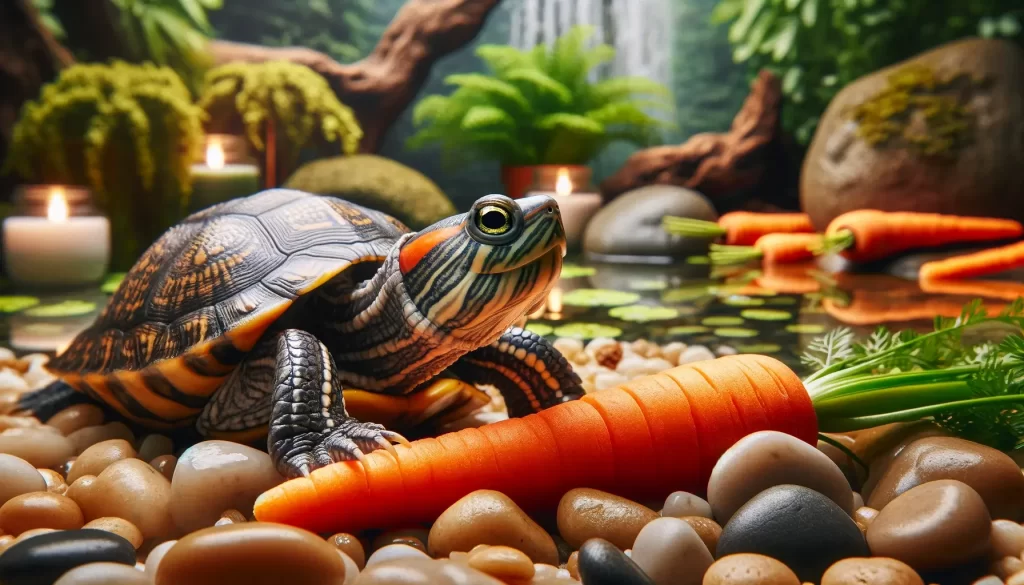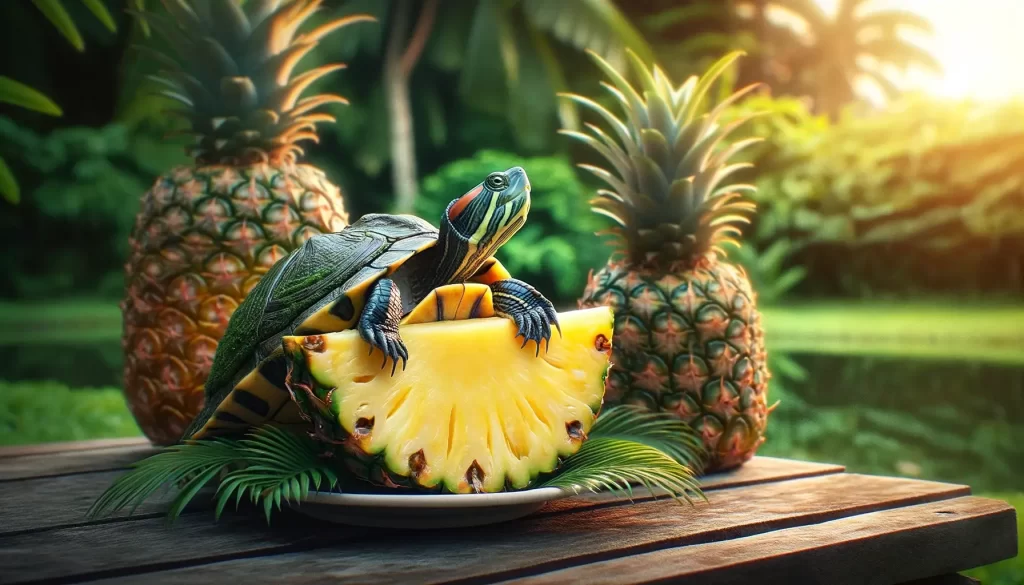Have you ever wondered if turtles can enjoy the crisp crunch of carrots? As a turtle owner myself, I understand the importance of providing a balanced and nutritious diet for these delightful shelled creatures.
Yes, turtles can safely eat carrots as part of a balanced diet, but moderation is crucial due to factors like the calcium-to-phosphorus ratio, sugar content, and oxalates present in carrots. It’s important to prepare carrots properly, considering the turtle’s size and species, and offer them as occasional treats or supplements to their regular diet.
Understanding Turtle Nutrition
Before we delve into the topic of whether turtles can eat carrots, it is crucial to have a clear understanding of their basic nutritional needs and the importance of vegetables in their diet.
Just like any other living creature, turtles have specific dietary requirements that vary based on their species and age.
Some turtles are classified as omnivorous, meaning they consume both plants and animals, while others are herbivorous, primarily feeding on vegetation.
Basic Nutritional Needs of Turtles
Turtles require a well-balanced diet to thrive and maintain their health. The key nutritional components for turtles include:
- Proteins: Proteins are essential for tissue growth and repair in turtles. They are vital for the formation of the shell, muscles, and organs.
. - Vitamins: Turtles need a variety of vitamins, such as vitamin A, vitamin D, and vitamin E, for proper growth, immune function, and overall well-being.
. - Minerals: Important minerals like calcium and phosphorus are necessary for a turtle’s bone strength and development.
. - Fiber: Fiber aids in proper digestion and helps prevent digestive issues in turtles.
The Role of Vegetables in a Turtle’s Diet
Vegetables play a crucial role in meeting a turtle’s nutritional needs. They provide essential vitamins, minerals, and fiber that contribute to their overall health.
Leafy greens, such as spinach, kale, and collard greens, are excellent sources of nutrients for turtles.
These vegetables also contain high levels of water, which helps keep turtles hydrated.
Additionally, vegetables add variety and enrichment to a turtle’s diet, making mealtime more interesting and enjoyable for them.
Can Turtles Safely Eat Carrots?
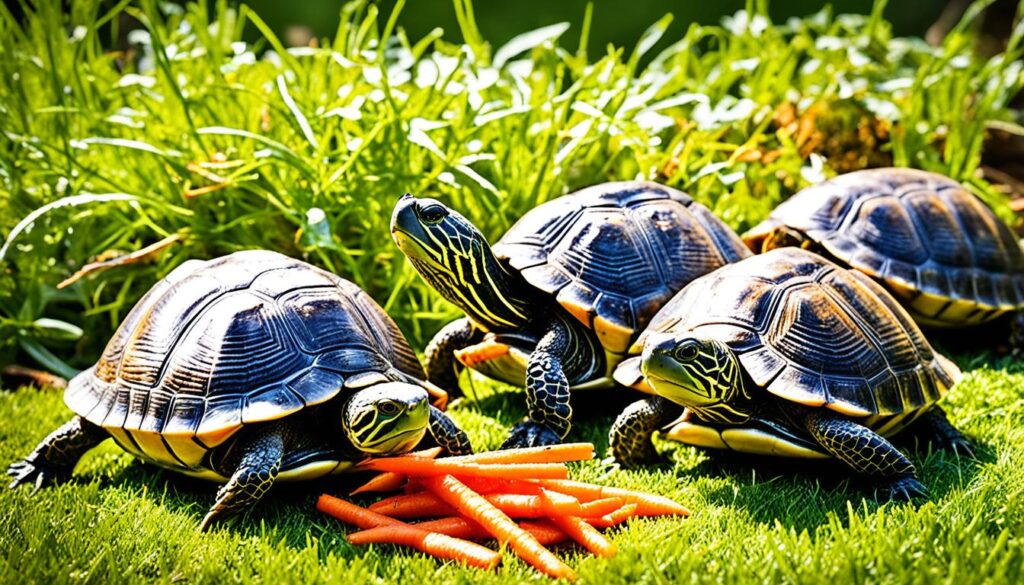
In this section, we will explore whether turtles can safely eat carrots. We will discuss the potential nutritional benefits of carrots for turtles, including their vitamin A content, fiber content, and low calorie count.
Additionally, we will address the potential risks and considerations of feeding carrots to turtles, such as the calcium-to-phosphorus ratio, sugar content, and oxalates present in carrots.
It is important for turtle owners to understand these factors to make informed decisions about their turtles’ diet.
Nutritional Benefits of Carrots for Turtles
Carrots offer several nutritional benefits for turtles. They are rich in vitamin A, promoting good eyesight and a healthy immune system.
The fiber found in carrots aids in digestion, helping turtles maintain a healthy gut. Additionally, carrots are low in calories, making them a suitable option for turtles who need to manage their weight.
Potential Risks and Considerations
While carrots can be a beneficial addition to a turtle’s diet, there are some risks and considerations to keep in mind.
Turtles require a specific calcium-to-phosphorus ratio to maintain proper bone and shell health.
Carrots have a low amount of calcium and a higher amount of phosphorus, which could affect this balance if fed in excessive amounts.
Carrots also contain natural sugars, so moderation is key to prevent weight gain and other health issues.
Additionally, carrots contain oxalates, which could contribute to the formation of bladder stones in some turtle species.
It’s important to consult with a veterinarian to determine the appropriate amount of carrots for your turtle based on their specific needs and health condition.
How to Feed Carrots to Turtles
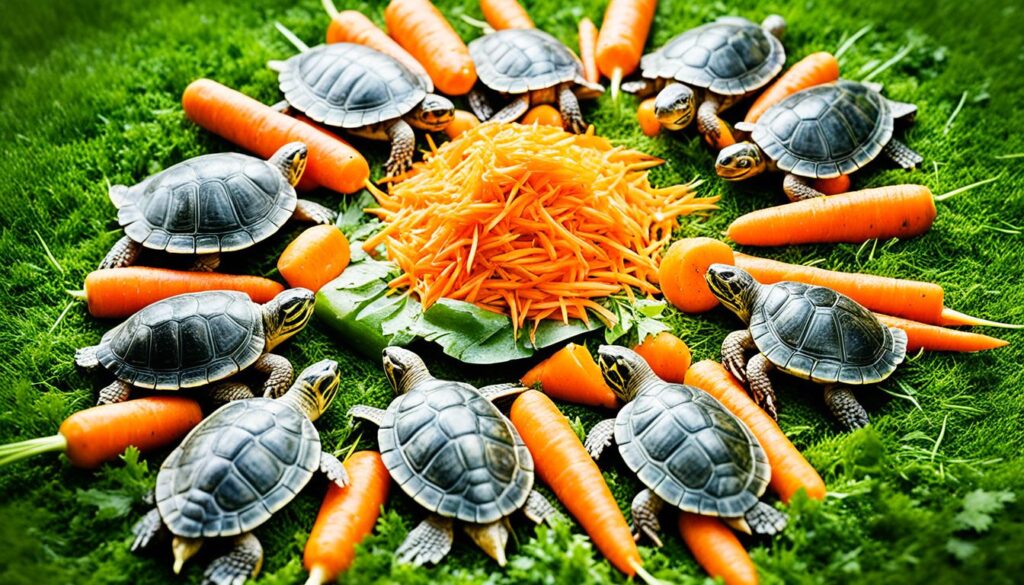
Turtles can enjoy the nutritional benefits of carrots when fed properly. Follow these guidelines to ensure your turtle’s health and well-being:
Preparing Carrots for Your Turtle
Before serving carrots to your turtle, it’s important to prepare them correctly. Follow these steps:
- Wash the carrots thoroughly to remove any dirt or pesticides.
- Cut the carrots into small, bite-sized pieces that are appropriate for your turtle’s size. This will make it easier for them to consume and digest.
By properly preparing carrots, you can ensure that your turtle can safely enjoy this nutritious vegetable.
Recommended Serving Size and Frequency
When feeding carrots to your turtle, it’s crucial to maintain moderation and balance in their diet. Follow these recommendations:
- Offer carrots as part of a varied diet, along with other vegetables and fruits.
- For small turtles, provide a few small pieces of carrot once or twice a week.
- For larger turtles, you can increase the serving size and frequency accordingly.
Remember, carrots should not make up the bulk of your turtle’s diet. It’s important to ensure they receive a well-rounded and varied nutrition plan.
Feeding carrots to turtles can provide them with essential nutrients, but it’s essential to follow proper preparation methods, serving sizes, and frequencies.
By incorporating carrots into a balanced diet, you can contribute to your turtle’s overall health and well-being.
Different Types of Turtles and Their Diets

Turtles are diverse creatures, with various species having different dietary needs.
Understanding the specific diet requirements of your turtle is essential for their overall health and well-being.
In this section, we will explore the differences between herbivorous and omnivorous turtles and provide specific diet recommendations for popular turtle species.
Herbivorous vs. Omnivorous Turtles
Turtles can be classified as either herbivorous or omnivorous based on their natural feeding habits.
Herbivorous turtles primarily feed on plant-based foods such as leafy greens, vegetables, and fruits.
These turtles have longer digestive tracts designed to process a high-fiber diet effectively.
On the other hand, omnivorous turtles have a more varied diet, which includes both plant matter and animal proteins like insects and small aquatic creatures.
Specific Diet Recommendations for Popular Turtle Species
Each turtle species has specific dietary requirements that must be met to ensure their health and vitality.
Here are some specific diet recommendations for popular turtle species:
- Red-Eared Sliders: Red-eared sliders are omnivorous turtles, and their diet should consist of a balanced mix of protein-rich foods, such as live or dried insects, and a variety of vegetables and aquatic plants.
. - Painted Turtles: Painted turtles are primarily herbivorous but can also consume small amounts of animal protein. Their diet should include leafy greens, vegetables, and fruits along with occasional treats like mealworms.
. - Musk Turtles: Musk turtles are omnivorous, and their diet should include a combination of aquatic plants, proteins like bloodworms or earthworms, and commercial turtle pellets.
It’s crucial to research the specific dietary needs of your turtle species and consult with a veterinarian or reptile specialist for personalized diet recommendations.
Alternatives to Carrots in a Turtle’s Diet
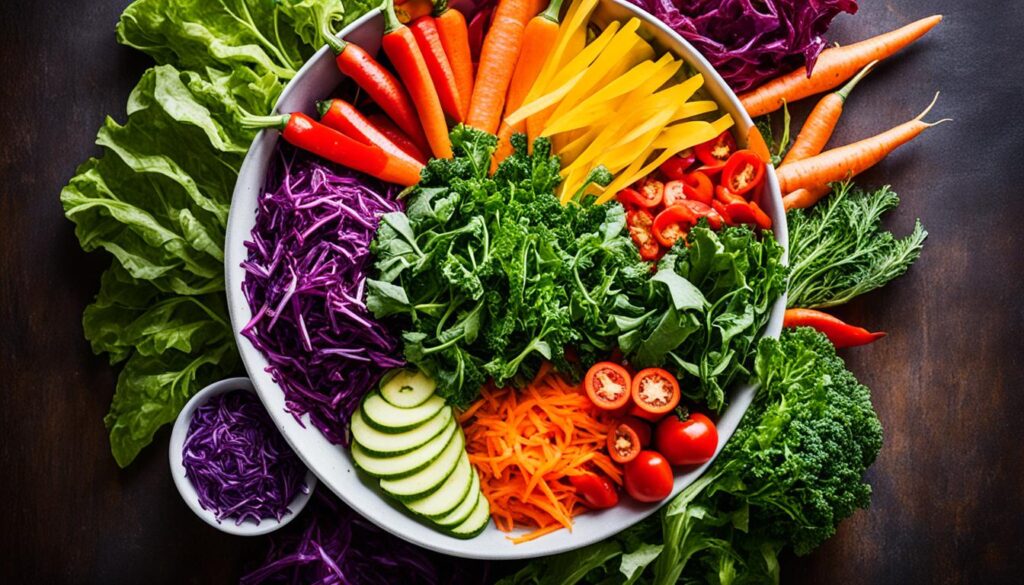
While carrots can be a part of a turtle’s diet, it is essential to provide a variety of other vegetables and fruits to ensure balanced nutrition for your shelled friend.
In this section, we will discuss alternative options to carrots that can be included in a turtle’s diet.
By diversifying their food choices, you can provide essential nutrients and promote overall health in turtles.
Other Vegetables and Fruits Safe for Turtles
Turtles can enjoy a range of safe vegetables and fruits in addition to carrots. Include these in their diet to offer a variety of flavors and nutrients:
- Leafy greens – such as kale, spinach, and romaine lettuce – are excellent sources of vitamins and minerals.
. - Squash – including butternut squash and zucchini – provides a good amount of fiber and vitamins.
. - Berries, such as strawberries and blueberries, offer antioxidant properties and can be given as occasional treats.
. - Apples and bananas are safe fruits that can be given in small quantities to add natural sweetness to their diet.
Remember to offer these vegetables and fruits in appropriate serving sizes and ensure they are fresh and thoroughly washed before feeding them to your turtle.
Balancing Your Turtle’s Diet with Variety
When it comes to feeding your turtle, variety is key. By including different vegetables and fruits in their diet, you can ensure they receive a wide range of nutrients.
A balanced diet for turtles should include:
- Leafy greens, such as collard greens, mustard greens, and dandelion greens, should make up a significant portion of their diet.
. - Other vegetables like carrots, squash, and bell peppers should be offered in moderation to provide additional vitamins and minerals.
. - Fruits can be offered as occasional treats, ensuring they are given in small quantities to avoid excess sugars.
. - Proteins such as cooked eggs, mealworms, or fish can be added to their diet for omnivorous turtles.
By providing a balanced and varied diet, you can meet your turtle’s nutritional needs and keep them happy and healthy.
Tips for Maintaining a Healthy Diet for Your Turtle
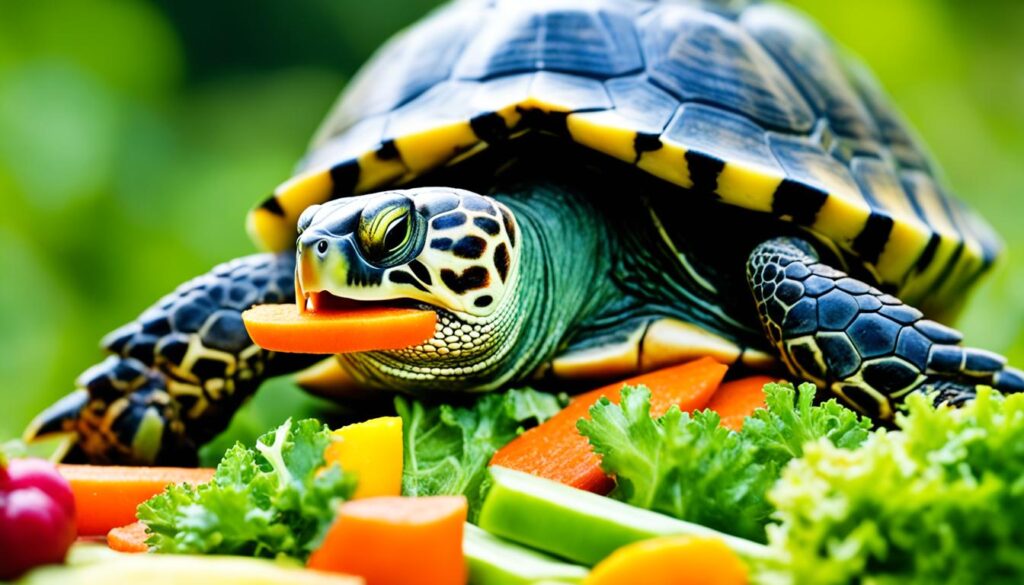
A healthy diet is essential for the long-term health and well-being of your turtle. By providing the right nutrition and making necessary adjustments as your turtle ages, you can ensure they thrive.
In this section, we will share some helpful tips to help you maintain a healthy diet for your turtle.
Monitoring Your Turtle’s Health
Regularly monitoring your turtle’s health is key to identifying any potential issues and ensuring they are thriving on their diet.
Keep an eye out for the following signs of good health:
- Bright and clear eyes
- Strong and sturdy shell
- Energetic behavior
- Healthy appetite
- Regular bowel movements
If you notice any changes in your turtle’s behavior, appetite, or physical appearance, it may be a sign of an underlying health issue.
Consult with a veterinarian who specializes in reptiles for guidance and appropriate treatment.
Adjusting the Diet as Your Turtle Ages
As your turtle grows older, their dietary needs may change. It is important to adjust their diet accordingly to support their changing nutritional requirements.
Consider the following factors when adjusting your turtle’s diet:
- Age and species: Different turtle species have different dietary preferences and requirements. Research your turtle’s specific needs and consult with a reptile veterinarian for tailored advice.
. - Nutritional balance: A well-rounded diet should include a mix of proteins, vegetables, and fruits. Ensure your turtle receives a balanced diet that meets their nutritional needs.
. - Portion sizes: Adjust the portion sizes of their meals as they grow. Be mindful not to overfeed or underfeed your turtle, as both can lead to health problems.
. - Supplements: Consider adding appropriate reptile supplements to their diet, such as calcium or vitamin D3, if recommended by a veterinarian.
By monitoring your turtle’s health and adjusting their diet as they age, you can provide them with the best chance of living a long and healthy life.
Conclusion
In conclusion, while turtles can safely eat carrots, it is important to remember a few key points to ensure their well-being.
First, a balanced and varied diet is essential for turtles, and carrots should be just one component of their overall nutrition.
Incorporating a range of vegetables and fruits into their diet will provide the necessary nutrients and promote optimal health.
Second, moderation is key when feeding carrots to turtles. While carrots offer nutritional benefits such as vitamin A and fiber, excessive consumption can lead to imbalances in their diet.
It is crucial to consult with a veterinarian to determine the appropriate serving size and frequency for your turtle, taking into consideration their species, age, and individual needs.
Lastly, monitoring your turtle’s health is vital. Regularly observe their behavior, appetite, and overall condition to ensure they are thriving.
Adjust their diet as they age, making necessary modifications to meet their changing nutritional requirements.
By following these safe feeding tips and considering the potential benefits and risks of feeding carrots to turtles, you can make informed decisions about your turtle’s diet.
Remember, your turtle’s well-being is in your hands, and providing a nutritious and balanced diet is essential for their long-term health.


